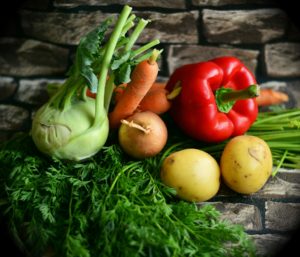It’s that time of year – the neighbors are busy harvesting and sharing the bounty of their gardens. There are times that gardens produce much more produce than is possible for a family, or even a neighborhood, to use. Donating wholesome foods to local food banks and food pantries reduces food waste, prevents foods from ending up in landfills, and provides quality, healthy foods to families in need.
First, contact your local food pantry to ensure they are accepting fresh produce and have adequate safe storage. Next, plan ahead for proper harvesting, holding, and delivery to the food pantry. Michigan State University Extension offers these tips to ensure top quality, safe produce:
Offer only go od quality, freshly picked produce to food pantries.
od quality, freshly picked produce to food pantries.
Handle fresh fruits and vegetables safely to minimize the risk of foodborne illness.
Don’t mix produce types. Keep each type in separate, clean, food-grade containers or bags.
Clean as much mud and dirt as possible off of the produce you plan to donate, but do not wash the produce as this reduces its natural protective barriers.
Choose produce that has no signs of mold, spoilage, bruising or insects.
In case you are concerned about legal issues, you can donate without fear. The Bill Emerson Good Samaritan Food Donation Act(PDF) protects donors wishing make contributions. Under this Act, as long as the donor has not acted with negligence or intentional misconduct, the company or individual making the donation is not liable should illness occur. The act was established to encourage the donation of food and grocery products to qualified nonprofit organizations.
For more information and tips to make your donation of fresh produce to your local food pantry a positive experience, visit Michigan Fresh, the Environmental Protection Agency’s Reduce, Reuse, Recycle resource page, or the USDA’s Food Waste Challenge.

